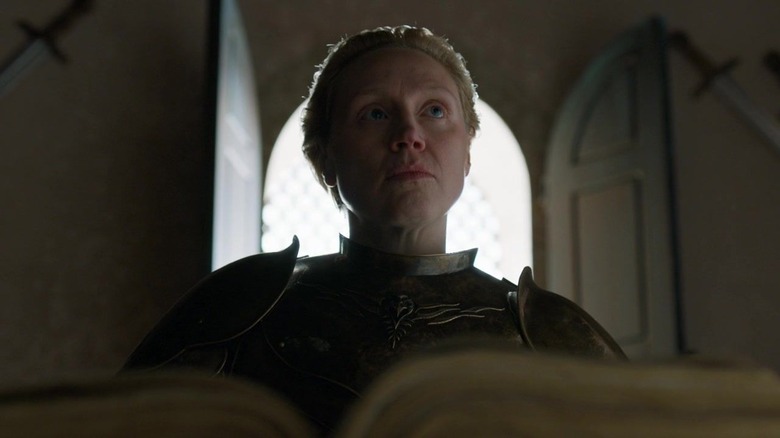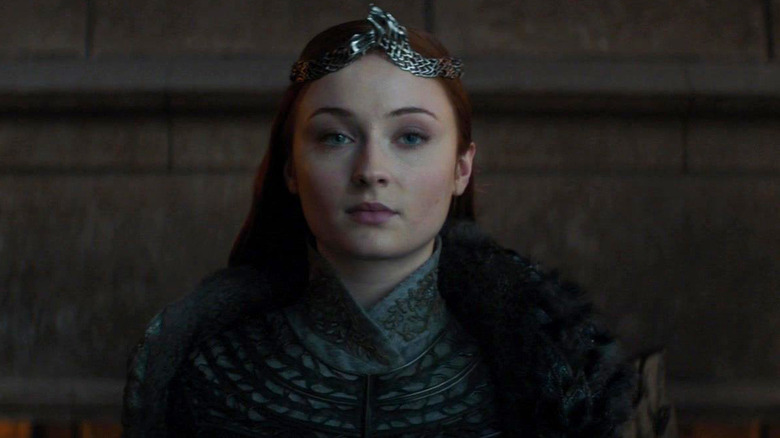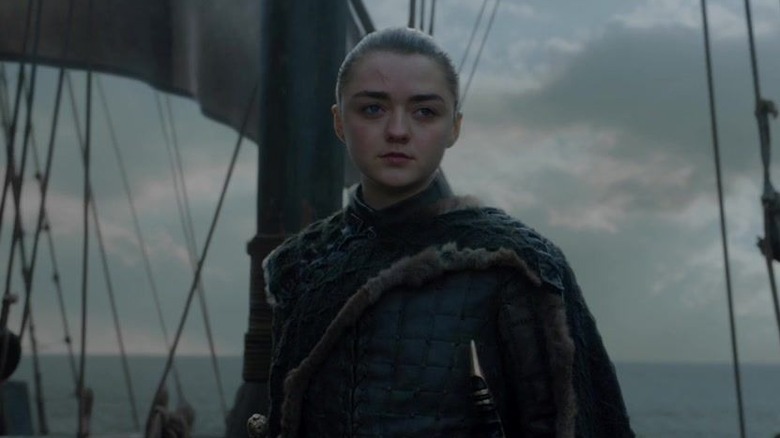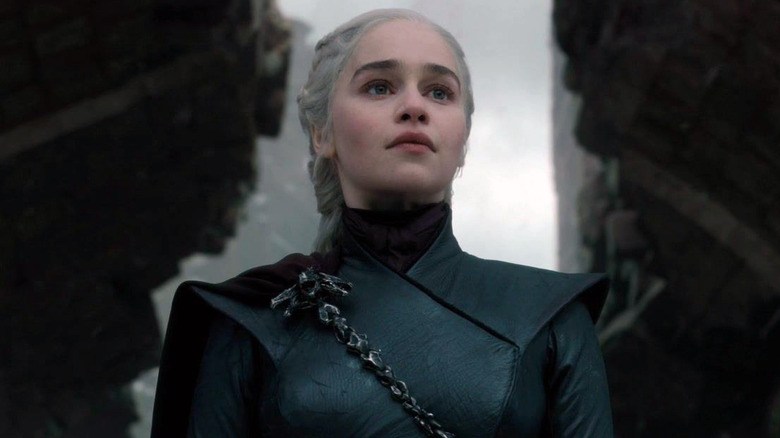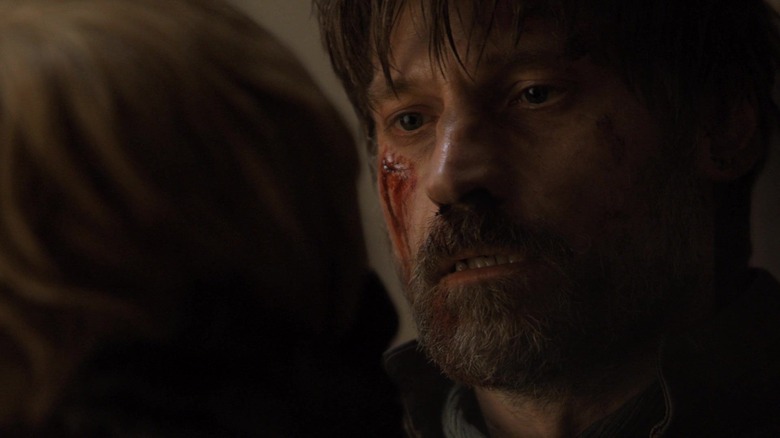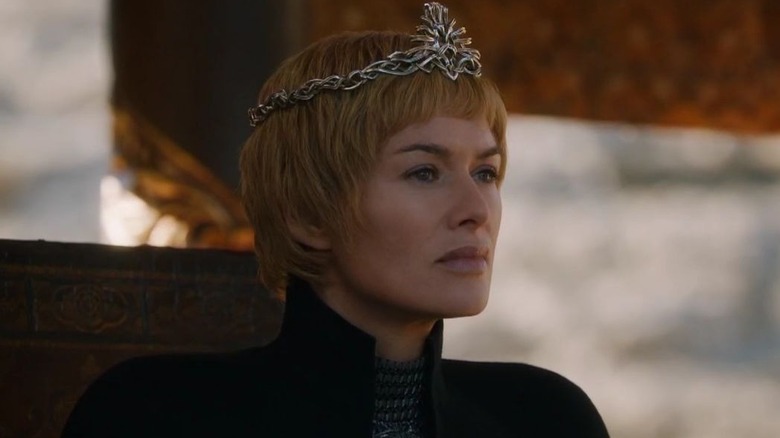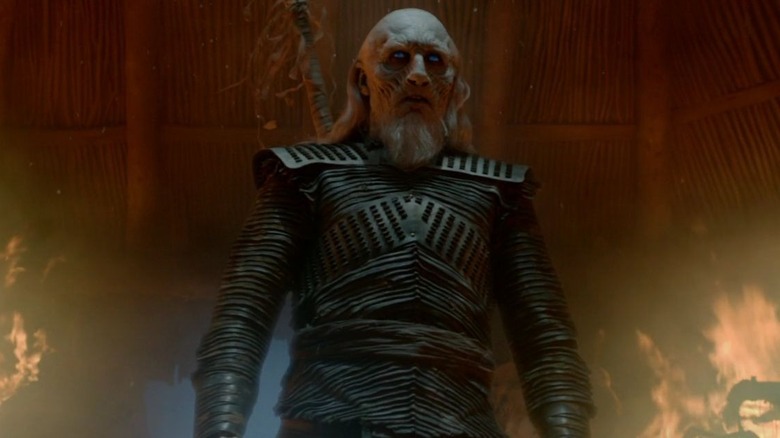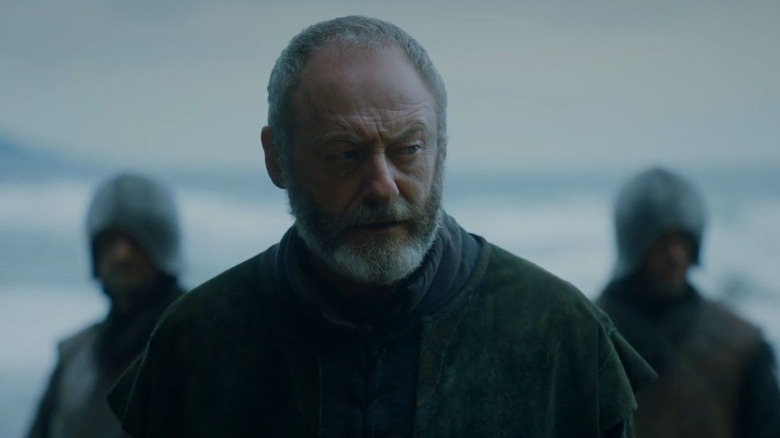The Ending Of Game Of Thrones We Really Wanted
Ending a beloved TV show is complicated. A successful finale needs to tie off multiple plot threads, guide characters toward satisfying fates, sum up major themes, and keep viewers interested. Most importantly, a finale must be well-supported and attention-grabbing. Fans shouldn't be able to predict every single thing that goes down, but endings that are too off-the-wall just feel confusing. Some shows succeed at this tricky balancing act. Some, however, do not. In many fans' opinion, the ending of "Game of Thrones" falls squarely into the latter category.
It's easy to figure out what "Game of Thrones" fans didn't want from their finale. Daenerys' plunge into civilian-slaughtering insanity left a lot of jaws dropped ... few in the good way. Jaime and Cersei's death-by-bricks is widely considered to be a let-down. The crowning of King Bran the Broken spurred more bewilderment than it did rejoicing. What, then, did fans want from the conclusion to HBO's pop culture-devouring fantasy saga? Epic battles, well-justified coronations, and a whole lot of wildfire, as it turns out. Join us as we explore the ending of "Game of Thrones" that we really wanted.
Warning — major spoilers below.
The White Walkers rampage across Westeros
The White Walkers loom over "Game of Thrones" like the specter of death itself. Sure, any given episode is stuffed with squabbling lords and ladies who think the White Walkers are a dusty old fairy tale, but viewers know better. They are the winter that is coming, and they aim to bring warm-blooded life to a cataclysmic end.
Unsurprisingly, the White Walkers' sudden defeat in "The Long Night" is the object of much criticism. In her proposal of a better ending for "Game of Thrones," Nneka McGuire, editor of The Lily, imagines something more depressing and more satisfying: "The Night King and his gang should have decimated the living." The macabre appeal of such an ending can't be denied. Moreover, it's in keeping with the show's themes — "Game of Thrones" loves to crush honor, hope, and goodness beneath its blood-stained heel. This is exactly the kind of destruction many fans wanted from the finale.
Moreover, planet-wide tragedy isn't the only option here, as McGuire details. The White Walkers could ravage Westeros, only to be beaten back at tremendous cost. Then, "in the final moments of the series," viewers would behold Craster's sacrificed sons, now a merry band of White Walker children. One day, this ending says, winter will come again. Such a potent mingling of victory and defeat is exactly the sort of finale "Game of Thrones" deserves.
Daenerys chooses peace and suffers the consequences
Daenerys' descent into madness might just be the most controversial aspect of the "Game of Thrones" finale. Thousands of fans have attempted to conjure better endings for everyone's favorite Khaleesi, but YouTuber Hello Future Me might just have the best proposal of all. Picture this: Daenerys, perched high above King's Landing on Drogon's back, hears the bells of surrender. Rage fills her, as it does in "The Bells" ... but she masters herself. Daenerys doesn't command Drogon to fill the streets with fire and blood. And in that moment of clarity, she is shot down. Daenerys and Drogon die together, beside the Essosi soldiers who knew her as the Breaker of Chains.
First and foremost, this ending addresses the problem of Daenerys' unconvincingly sudden bloodlust. But even more movingly, it completes Daenerys' story — and that of the Targaryen dynasty — in a thoughtful and resonant way. She refuses to be the Mad Queen, shaking off the shadow of her father forever ... but perhaps that sort of brutality is what it takes to rule in Westeros. Does this count as a victory or a defeat? Daenerys liberates thousands, brings dragons back into the world, and reclaims herself from degradation, but she struggles to lead in Meereen, Astapor, and eventually, King's Landing. This is the sort of thorny dilemma that made "Game of Thrones" and Daenerys herself into cultural icons. It's only fitting that they both end immersed in shades of grey.
Brienne writes herself into history
Brienne fans experience towering highs and devastating lows in Season 8. On the one hand, watching Jaime anoint her as Ser Brienne of Tarth is a triumph. On the other hand, Brienne and Jaime finally consummate their feelings ... only for Jaime to reaffirm his allegiance to Cersei and leave Brienne sobbing in a courtyard. Does the fact that she ends up becoming lord commander of the Kingsguard make up for this? According to many fans, it doesn't — especially since her final major act is completing Jaime's entry in "The Book of Brothers" with a passionate defense of his actions.
One Twitter user has a much better idea for Brienne's exit: Instead of writing that Jaime "died defending his queen," she concludes his story with his decision to anoint Westeros' first female knight, then starts her own entry. Foolishly, the show decides to devote the final chapter of Brienne's story to her relationship with Jaime. While he's doubtlessly important to her, Brienne is also vividly shaped by her allegiance to the Stark women, her lifelong defiance of gender roles, and her mentorship of Podrick. If we must see her memorialize the man who loved and left her, let her take up space within his story, then turn the literal and figurative page on all of it as she embarks upon her future. Brienne loves Jaime, but Brienne also loves swords, honor, and kicking men into the dirt. Her ending should reflect this.
Sansa Stark, queen of the Seven Kingdoms
Despite Peter Dinklage's best efforts, Tyrion's impassioned attempt to convince us all that Bran deserves to rule falls flat. Bran's journey is, frankly, largely extraneous, to the point that he's entirely missing from Season 5 — a fact few have ever lamented. How, then, is the audience supposed to agree with Tyrion when he argues that Bran has the best story and should gain massive power as a result? Especially, as Lacy Baugher Milas of Paste Magazine asserts, when Sansa is sitting directly in front of him?
Sure, Sansa becomes queen in the North. That's not exactly a shoddy consolation prize — especially since she's cooled on the other six kingdoms. But imagine Tyrion's speech ending with a gesture towards Sansa. It's a lot easier to rhapsodize over her arc than Bran's. Once an innocent, then a victim, now a steely leader, Sansa's victory is won through enormous growth. Bran is entirely removed from the world, but Sansa is defined by having been consumed by it — until she rips her way out. Isn't that sort of escape from a crushing system precisely what so many of her benighted subjects long for? Here is a queen for a people in need of inspiration. Greeted with such an ending, fans might have cheered. Confronted with Bran, they merely stared at each other in confusion.
Arya finally gets her revenge on Cersei
After a lifetime of murder, betrayal, cruelty, and destruction, Cersei is killed ... by falling bricks. Perhaps that's selling things a bit short — those falling bricks previously made up the Red Keep, after all, and there's a certain justice in Cersei being crushed by the very seat of power she so viciously sought. Plenty of fans still wish she'd met a different end, however — including Arya's actress, Maisie Williams.
Williams, who spent years murmuring Arya's to-kill list on camera, wanted her character to assassinate Cersei. She was so certain this would happen that, according to "Fire Cannot Kill a Dragon" (via NME), she thought Jaime was going to "whip off his face" under the Red Keep and reveal himself as Arya. Arya would die too in this scenario, but she'd finally get her revenge, and that'd be satisfaction enough for Williams. Many Arya fans agree with her, and it's not hard to see why. Such an ending pays off one of the oldest grudges on the show and makes Arya's Faceless Man training relevant. It's even in line with the show's cynicism, as Arya's desire for vengeance ends up literally destroying her. There are certainly Arya fans who'd be disappointed by such a brutal end for their favorite assassin, but there are plenty more who'd love to see her go out victorious.
Jon Snow's Targaryen heritage is revealed
After years of speculation, "Game of Thrones" finally confirmed that Jon Snow was, in fact, the legitimate son of Rhaegar Targaryen and Lyanna Stark. Yet in the end, this revelation didn't amount to much. Sure, characters like Sansa and Tyrion will go on knowing the truth, but this doesn't really change the fact that Jon's future lies in the far north, among people who don't even believe in kings.
Jon's illustrious parentage coming to nothing is in line with the show's subversive approach to fantasy tropes, but its near-total lack of major effect still rankles. Podcaster Abe Proctor offers a solution in his alternate ending: As multiple characters look on, Drogon blasts Jon with fire instead of the Iron Throne. This fails to incinerate him, thus revealing his Targaryen heritage. The fallout is instantaneous and intense. As Proctor details, "The possibility of a power struggle between Jon and Sansa is mouthwatering."
In this ending, Jon might very well still end up among the Wildlings. But he, and a whole lot more of Westeros, have to confront the truth to get there. How might this world handle, on a wide scale, an heir who doesn't endorse hereditary monarchy? Does this spur chaos, enlightenment, or something else entirely? Jon refusing the throne, as he does in the canonical "Game of Thrones" ending, subverts expectations, but Jon refusing the throne as a shocked populace looks on leaves those expectations in shreds.
Daenerys returns to Essos, her true homeland
Daenerys' victories are typically accompanied by adoring crowds. When she finally makes it to Westeros, however, she finds an indifferent public. Of the many injuries and insults that drive her to violence, this is one of the sharpest — yet her homicidal rampage still rings false. Realizing she's effectively a foreigner in her so-called native land would hurt, to be sure, but Daenerys has endured unpopularity before without going on a killing spree.
The thing is, as one Reddit user points out, Daenerys' sorrow doesn't have to tip into inhumanity. In their proposed ending, Daenerys accepts the fact that she has no place in Westeros and takes her troops back across the Narrow Sea. This ending highlights a bitter truth at the heart of Daenerys' story: History has left her homeless, a fact no dragons can obscure. It also echoes Targaryen history, creating a story arc with 300 years of build-up. As Aegon Targaryen once emerged from destruction to conquer Westeros, so does Daenerys leave the realm that shattered her family for a new life in Essos.
Though she loses the Iron Throne, this doesn't even necessarily need to be a downer ending — there's something glorious in Daenerys deciding to return to the lands of her ancestors, with the intent of making them a more just place. Most importantly, it'd leave fans a whole lot happier than the murderfest "Game of Thrones" actually treats them to.
Jaime Lannister becomes the Queenslayer
Jaime Lannister grows by leaps and bounds over the course of "Game of Thrones." Yet he dies where he starts, in Cersei's arms. Fans of all stripes find this disappointing, from those who love Jaime and Brienne's romance to committed Cersei-haters. What's the point of all that growth if it ends up smushed beneath the Red Keep?
One Reddit user has come up with a fascinatingly simple fix for Jaime's ending. Before death rains down upon them, Jaime stabs Cersei in the back. This might seem inconsequential, but its thematic meaning is enormous. In stabbing Cersei, Jaime commits an act of murder and mercy, befitting his complex allegiances. Perhaps he's saving the woman he loves from a more painful death, or perhaps he's taking vengeance upon the woman who recently hired Bronn to kill him.
Stabbing Cersei also echoes his murder of King Aerys. Once again, he slays a dangerous ruler, but this time, it's an act done for himself alone. No one will ever know he does it, and it doesn't save the realm from ruin. But it affirms the honor Brienne has helped him discover — honor that is, like hers, unquestionably noble, despite the world's misunderstanding of it. This alternate ending rests on a minor change, but its implications are as huge as Jaime's journey.
Tyrion embraces the dark side, then lives to regret it
Tyrion's intelligence is his greatest asset. In the last few seasons, however, it often seems to be missing. YouTuber Macabre Storytelling argues that Tyrion's turn for the wishy-washy is linked to the show's desire to keep him on the side of the angels. In the books, Tyrion becomes a much darker figure after killing Shae and Tywin. The show removes that arc, but it lacks anything better to replace it with. Thus, Tyrion makes a lot of decisions that don't make any sense the moment you think about them for more than 30 seconds.
How would Macabre Storytelling do things differently? He'd let Tyrion keep being the man who wishes death upon King's Landing in Season 4's "The Laws of Gods and Men." Once he's at Daenerys' side, this Tyrion encourages her to embrace the path of fire and blood so that he might get his revenge. But when she lays waste to King's Landing — an act that makes more sense in this telling — he realizes the true horror of what he's done. Instead of Jon Snow, then, it's Tyrion who kills Daenerys. This ending takes the story to the sort of blisteringly tragic place "Game of Thrones" loves to go, without resorting to Season 8's unconvincing twists. All it requires is a willingness to let Tyrion indulge his anger — and really, who wouldn't want to watch Peter Dinklage pull that off?
Cersei destroys the Red Keep
Though she spends most of Season 8 drinking wine and posing imperiously, Cersei Lannister is one of the most dynamic characters on "Game of Thrones." Her ending does not honor this, to say the least. Vocal Media writer Tyler Callaway imagines five substitute deaths that "would've done Cersei Lannister justice," one of which is particularly intriguing and thoroughly foreshadowed: What if Cersei blew up the Red Keep herself?
Let's say Cersei booby-traps the castle with wildfire in the hopes of luring Daenerys there. Once she realizes the Dragon Queen can't be stopped, she decides to go out on her own terms. In a massive green explosion, she brings the Red Keep down, denying Daenerys the pleasure of killing her and taking up the seat of her ancestors. This is exactly the sort of spiteful thing she'd do, but it also encapsulates her defining struggle for autonomy. Cersei is monstrous, but the world has been monstrous to her from the day she was born. This doesn't excuse her actions, but it does inform them. Someone denied a voice is going to want to make the biggest statements possible, by doing things like blowing up the Sept of Baelor ... or the Red Keep. Plus, such an ending creates a powerful parallel to Daenerys' own fiery acts of destruction against a world that tried to break her.
All of Westeros unites to take down the White Walkers
Despite seven seasons of build-up, the White Walkers aren't actually the ultimate enemy of "Game of Thrones." In fact, after they're dispatched in "The Long Night," three whole episodes still remain. This strikes many fans as a fumble since the show spends a huge amount of time portraying humanity's inability to focus upon the White Walker threat as their likely undoing. One Reddit user's blueprint for a better ending offers a solution: Cersei is defeated before the battle with the White Walkers takes place, making way for a conflict like none Westeros has ever seen.
In this fan's version, the White Walkers overrun the North, sending a flood of terrified survivors south. This doesn't just make it clear to the rest of Westeros that the Walkers are real, it proves that they're an existential threat. This forces the realm to unite like never before. Imagine seeing Lannisters, Starks, Martells, and members of every other house put their differences aside to conquer the undead. The potential for greatness is immense — "Game of Thrones" excels at portraying battlegrounds, and this one could've topped them all. Thousands of fans wanted this sort of ending — not solely because it would be awesome but because it's what the series foreshadows. Instead, they get one (pretty cool, admittedly) episode, followed by three installments of Walker-less discord.
Davos Seaworth takes the Iron Throne
"Game of Thrones" isn't big on characters who could be described as "pure of heart," but Davos Seaworth comes close to fitting the bill. The Onion Knight was born a lowly peasant, but he ends the series as King Bran's master of ships. The fact that he accomplishes this by being a forthright, loyal, and compassionate person (and, okay, an occasional smuggler) is astonishing. It also makes for one heck of a story. By Tyrion's own logic, and that of this Reddit user, that means he should be king. How can anyone possibly top a journey from Fleabottom to the throne?
This ending is meaningful, clever, and unexpected — three things "Game of Thrones" loves to be. It also goes a long way to making Tyrion seem like an intelligent and innovative person again. With a little Davos-specific tweaking, his argument becomes genuinely groundbreaking. A commoner on the throne is a story that would grab the public's attention like nothing else. It also makes the ending feel less like, as Daenerys would put it, another turn of the wheel. Yes, Bran is an unusual lord, but he's still always had a last name. Davos on the throne is an actual challenge to the status quo, without being the sort of outright revolution that would stretch credulity. Plus, who wouldn't enjoy seeing Davos be lavishly rewarded for his years of steadfastness? Onions for everyone!
Missandei meets literally any other fate
Missandei's death feels unjustified. It's clearly meant to push Daenerys into "mad queen mode," but as fans have made clear, that plot twist just isn't convincing. Beyond that, it's simply, stupidly mean. Do we really need to see a woman who endured slavery (not to mention one of the only long-term characters of color on the show) die as a pawn in the larger game of thrones? Missandei's death fails to be shocking, motivates nothing worthwhile, and insults the character.
You know what ending fans really wanted for Missandei? Literally anything else. One Reddit user imagines Missandei losing an arm, rather than her head. This Missandei could travel to King's Landing with her own desire for revenge. Or perhaps she still dies but takes Cersei with her, as another fan envisions. This creates an abundance of storytelling opportunities, and it ends Missandei's arc with an act of world-changing defiance.
A complete reversal of Daenerys' fortunes would also be welcome to many. One Tumblr user imagines an ending featuring Daenerys on the throne, with Missandei as hand of the queen. It's hard not to smile at the prospect of the girl once ripped from Naath becoming the power behind the Westerosi throne. Plus, the idea is bursting with potential. How might Westeros' foreign policy change under Missandei's guidance? Which lords would embrace her vision? All of these endings are interesting, but most importantly, they're a whole lot better than the one we got.
Bran's ability to time travel becomes relevant
Bran's ability to see into the past becomes increasingly important as "Game of Thrones" marches to its conclusion. He reveals Littlefinger's betrayal to his sisters, discovers the White Walkers' origins, and confirms that Jon Snow is the legitimate heir to the Iron Throne. And yet, Bran's psychic prowess ends up mattering very little in the conflicts that define the end of the show. He acts as bait for the Night King, and then he's crowned. Hurray?
What if, as one Reddit user proposes, Bran's ability to warg through time was crucial to the final battles of "Game of Thrones?" This fan invokes King Aerys' infamous caches of wildfire, hidden all over King's Landing. In Season 6's "Blood of my Blood," Bran sees Aerys' pyromancers crafting the infamous substance. When Daenerys burns King's Landing, green flames explode here and there, likely from wildfire planted by her father. In a better ending, Bran's knowledge of Aerys' wildfire caches could play an enormous role. It could be weaponized against Cersei, Daenerys, or heck, even the White Walkers, if one imagines the Battle of Winterfell going very differently.
Not only does this sort of ending pay off years' worth of build-up, it also makes Tyrion's argument for Bran on the throne a lot more effective. "The guy who can see into the past should be king" lands better when the guy in question has recently used his powers to win a climactic battle.



